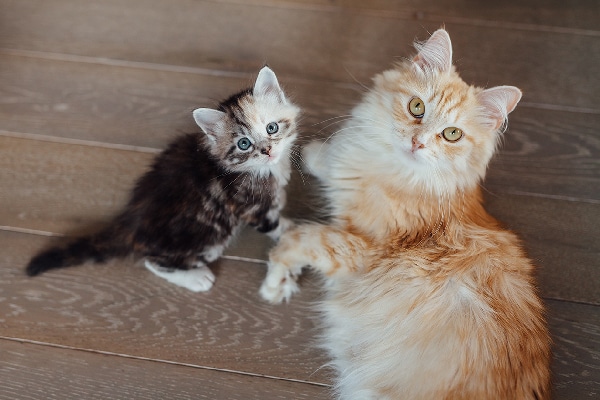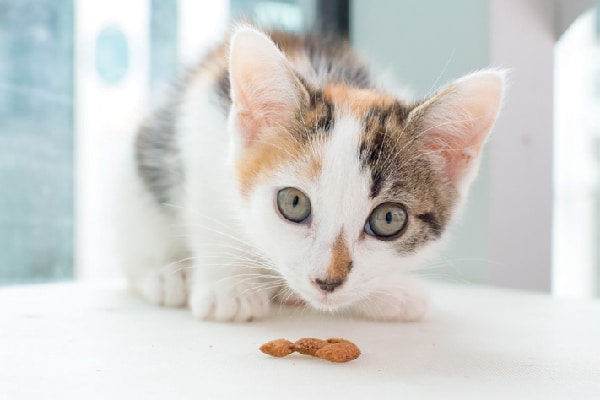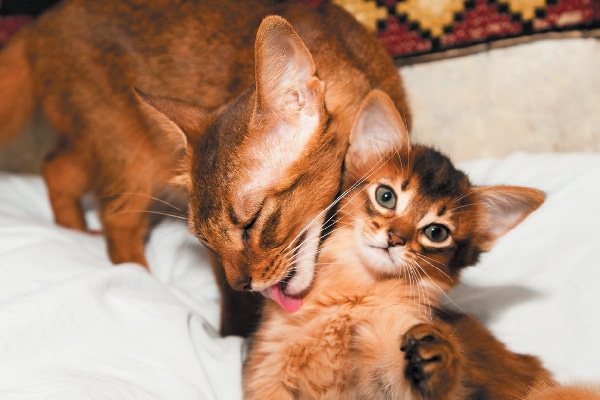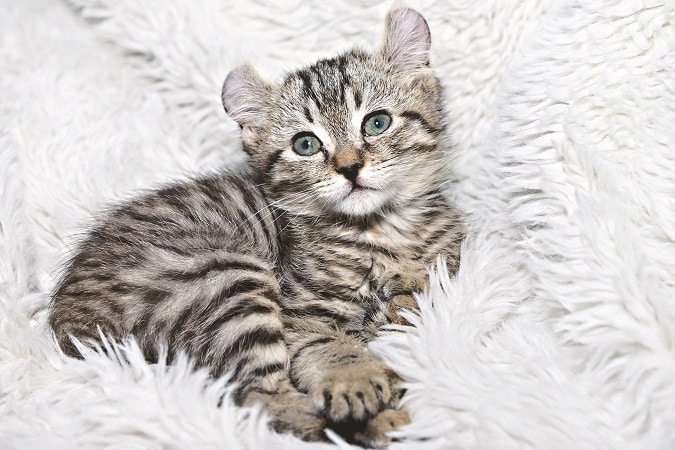Some cats are as light as 5 pounds, while others tip the scale at closer to 20! Cats come in almost as many sizes and shapes as they do colors. From the svelte Sphynx and Siamese to the seemingly supersized Maine Coon and Ragdoll — all little kittens, with proper nutrition, will grow into their big personalities soon enough. But have you ever wondered — when do cats stop growing? Let’s find out!

When Do Cats Stop Growing?
Many new cat parents ask the burning question: “When do cats stop growing?” Kittens grow rapidly until 6 months old. Between 6 months to 12 months is when kittens stop growing in size.
This doesn’t necessarily mean that cats over a year old will stop growing altogether. A cat who is mostly sedentary and on a poor diet, or has access to too much food throughout the day, can continue to pack on fat. While an obese cat may look cute all roly-poly, obesity is in fact a very unhealthy condition for any feline.

How Big Will My Cat Get?
Another question associated with, “When do cats stop growing?” is, “How big will my cat get?” The average domestic feline is about 10 pounds, give or take a few pounds. The males of the largest cat breed, the Maine Coon, can weigh in at around 20 pounds. Cats are not like dogs in many aspects, and there isn’t a correlation between your cat’s paw size and his height and weight. Bigger paws don’t really mean a bigger cat. How big your cat will get is determined by genetics. There are 19 pairs of chromosomes that control everything from hair length, coat color, and, yes, size!
While your kitten’s parents are the best indicator of how big your cat will get, sex can also be a factor. Males are usually bigger than females, and the duration of their growth spurts can last longer.
Full-sized and Miniature-sized Outliers
Of course, there are exceptions to everything, including exceptions to the answers to “When do cats stop growing?” According to the Maine Coon Fancy, this breed of cat takes up to 5 years to reach full size. And their full size is noteworthy: a Maine Coon cat named Stewie held the Guinness Book of World Record’s record for the longest cat at 48.5 inches stretched out. Sadly, Stewie passed away in 2013, but his mark on the world remains.
On the other side of the spectrum, cats with dwarfism can be abnormally small. Dwarf cats are the Lilliputians of the feline world (there are two different causes: genetic mutation and pituitary gland malfunction). A Munchkin cat named Liliput holds the Guinness Book of World Record’s record for the shortest cat. Kittens with dwarfism will develop more slowly than healthy cats.

When Do Kittens Stop Growing?
Another common question with, “When do cats stop growing?” is, “When do kittens stop growing?” Kittens come into this world with one goal: to grow! And quickly! Newborn kittens require round-the-clock feeding, and their spikes in weight gain reflect all that nutritious sustenance.
Kittens typically grow eight times their size in just about 8 weeks:
- Under 1 week old: kitten weighs less than 4 ounces.
- 7 to 10 days old: kitten weighs 4 to 6 ounces.
- 10 to 14 days old: kitten weighs 6 to 8 ounces.
- 14 to 21 days old: kitten weighs 8 to 12 ounces.
- 4 to 5 weeks old: kitten weighs 12 ounces to 1 pound.
- 6 to 7 weeks old: kitten weighs 1 pound to 1 pound and 8 ounces.
- 8 weeks old: kitten weighs 1 and a half to 2 pounds.
- 12 weeks old: kitten weighs 3 pounds to 5 and a half pounds.
- 16 weeks old: kitten weighs approximately 5 and a half pounds to 7 and a half pounds.
- 6 months to 1 year old: approximately 8 pounds to 15 pounds.
The Bottom Line
While kittens will stop growing at about 1 year old, it’s important to remember that most kittens will look like an adult at 6 months old. For folks considering adoption, maybe a kitten isn’t the best fit for their home (see some benefits of adopting an older cat here). That adorable little fluff ball will only boast a juvenile appearance for a very short time. He’ll look like an adult cat before he hits his first birthday.
Of course, feeding your cat a healthy diet, always providing a freshwater source, and enriching his environment with plenty of exercise, places to climb, and hidey holes to explore will ensure he not only grows big and strong but is the happiest and healthiest he could be!
Thumbnail: Photography © jakubzak | iStock / Getty Images Plus.
Read more about kittens on Catster.com:





